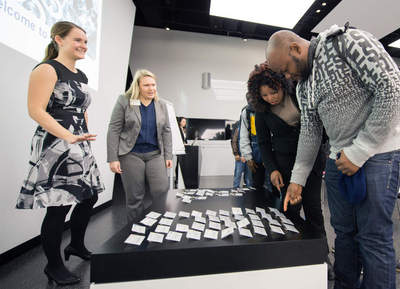40 Refugees Start 'Bridge Internships' at Daimler
 40 refugees start 'bridge internships' at Daimler |
- Participants from Afghanistan, Eritrea, Gambia, Nigeria, Pakistan and Syria
- Fourteen-week internship in cooperation with the German Federal Employment Agency
- Daimler qualifies refugees for the German labor market
- Internships for several hundred more refugees are planned at other company locations
STUTTGART -- November 9, 2015: Forty refugees and asylum
seekers have started a so-called 'bridge internship' at Daimler. The
participants who come from Afghanistan, Eritrea, Gambia, Nigeria, Pakistan
and Syria are between 20 and 51 years old. In the program Daimler is
working with the German Federal Employment Agency and Job Centers. Wilfried
Porth, Member of the Board of Management of Daimler AG responsible for
Human Resources and Director of Labor Relations, IT & Mercedes-Benz
Vans: "We see immigration as an opportunity. For it to work, the
integration of the refugees has to be successful. Our 'bridge internship'
helps us to contribute to this political and social goal by smoothing the
way for people to enter the German labor market."
This internship lasts 14 weeks. The participants were
selected by the Federal Employment Agency and the competent Job Centers.
They are not in competition with the core workforce or temporary workers.
Successful participants can be placed in other companies, temporary
agencies, and professional training programs.
"The best way for people to integrate is at the workplace.
Doing things together creates understanding for one another. That is why we
are delighted that many colleagues have expressed a willingness to mentor
the 'bridge interns'. Discrimination and racism have no place at Daimler.
We support the program, which we see as humanitarian aid within our
practical possibilities. However, it is also clear: The 'bridge interns'
are not in competition with temporary agency workers or our core workforce.
This program does not put anybody at a disadvantage," said Michael Brecht,
Chairman of the General Works Council at Daimler AG.
German lessons for three-and-a-half hours per day
The 'bridge interns' start work
with their co-workers on the early shift at 6:00 a.m. The working time for
the practical section is three-and-a-half hours per work day. In axle
production and logistics, the aim is to provide the trainees with some of
the basic skills for the work in industrial production. In the training,
they can learn how machines are equipped or how components and sorted and
provided, among other things. The participants also gain insights into the
way Daimler employees operate robotic welding machines or do the service
maintenance for other machinery. Refugees spend another three-and-a-half
hours per day learning German in small groups of 10 people and receive help
with writing job application letters, for example.
The German Federal Employment Agency finances the first six
weeks of the internship. For the remaining eight weeks, Daimler pays
compensation for the daily work time of three-and-a-half hours in
accordance with minimum wage law. Daimler is financing the German
courses for the full duration of the bridge internships. "As a large
company, we are assuming our social responsibility and are making our
infrastructure available. We can certainly get more done than many small
and medium-size companies, which do not have our possibilities," said
Wilfried Porth.
The first 'bridge
internship' has started at the Mercedes-Benz plant in
Stuttgart-Untertürkheim. The program is to be extended to other locations
in the coming weeks and months. With the 'bridge internships' organized in
cooperation with the German Federal Employment Agency, Daimler wants to
prepare several hundred refugees and asylum seekers for the German labor
market.
Many aid campaigns for
refugees
Daimler has been
providing active assistance for refugees for some time. Since 2013, the
company has worked with “Wings of Help” to send three convoys
with relief supplies to Syrian refugee camps in Turkey. The company also
sponsors other integration projects in Stuttgart and Sindelfingen, has
donated one million euros to "Ein Herz für Kinder" (A Heart for Children)
to aid refugee children and, with its employees, has provided more than
600,000 euros to the German Red Cross for use as emergency aid for
refugees. Further assistance ranges from financing German lessons to food
donations from Daimler canteens. In addition, the company has also provided
a "helpers' fleet" of Mercedes-Benz vehicles to relief organizations.
Daimler's team of company physicians also examines the medical care
provided to refugees in their living
quarters.


